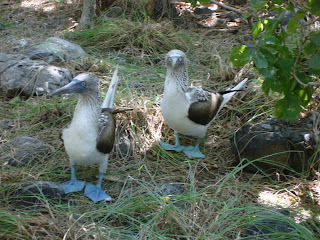 Our first stop heading south on S/V Estrella from Mazatlan was an 80 mile journey to Isla Isabel. This beautiful island is considered the "Galapagos of Mexico" because of the extensive number of birds living on the island.
Our first stop heading south on S/V Estrella from Mazatlan was an 80 mile journey to Isla Isabel. This beautiful island is considered the "Galapagos of Mexico" because of the extensive number of birds living on the island.Sharing Isla Isabel with the birds is a commercial fishing camp. Seen behind Josh in the above photo, the fisherman's homes/storage sheds provide shelter for the island's permanent non-bird population.
 Isla Isabel is an extinct volcano and the above "Lago Crater" (or "crater lake") is all than remains of the volcano. After the last eruption of the volcano, the crater collapsed and eventually freshwater seeped into the caldera to form the lake.
Isla Isabel is an extinct volcano and the above "Lago Crater" (or "crater lake") is all than remains of the volcano. After the last eruption of the volcano, the crater collapsed and eventually freshwater seeped into the caldera to form the lake. Hiking up and out of the caldera towards the far side of the island provided quite the vantage point. The anchorage for Isla Isabel is beyond the distance ridge in this photo.
Hiking up and out of the caldera towards the far side of the island provided quite the vantage point. The anchorage for Isla Isabel is beyond the distance ridge in this photo. There were hermit crabs living in and around the caldera.
There were hermit crabs living in and around the caldera.Perhaps the most comical of the bird species on Isla Isabel, blue-footed boobies were found in every habitat on the island. And like all birds here, they were fearless when it came to human interactions (for better or for worse).
When I came upon this mating pair on the trail, they were practicing part of their mating ritual. This involves a synchronized dance in which each individual shows the other the bottoms of his/her feet.


Another brown booby who was on security detail as I walked by on the trail.

The noise emitted by these male magnificent frigate birds when the red throat balloon is inflated sounds much like a drumming rattle.
One observation I made quickly after entering the unpopulated portion of Isla Isabel (95% of the island) was the overwhelming noises made by the birds and other creatures on the island. Every step I took while hiking upset a marine iguana or three. The constant noise of the birds was pervasive on the ground and above in the trees.
 A partially utilized research station was the home of a cluster of marine iguanas, some of the largest in length and girth I've ever seen.
A partially utilized research station was the home of a cluster of marine iguanas, some of the largest in length and girth I've ever seen.
 S/V Estrella (center of photo) an anchor at Isla Isabel. The anchorage had the clearest water I've seen yet on the mainland side of Mexico. There is very little pollution of any kind here and the permanent commercial fishing operation here easily supports itself with the abundant fish around Isla Isabel.
S/V Estrella (center of photo) an anchor at Isla Isabel. The anchorage had the clearest water I've seen yet on the mainland side of Mexico. There is very little pollution of any kind here and the permanent commercial fishing operation here easily supports itself with the abundant fish around Isla Isabel.







No comments:
Post a Comment